#national book foundation
Text
National Book Foundation, I don't have twitter to tell you thank you for rescinding your invitation to Drew Barrymore as a host for your ceremony. She is scabbing, and must be held accountable. Thank you for standing with the unions.
Heartbroken, as Drew is one of the few people in Hollywood who had my respect and I didn't have anything bad to say about her.
#national book foundation#national book awards#drew barrymore#wga strong#wga strike#support the wga#wga solidarity#i stand with the wga#writers strike#sag strike#sag aftra#sag afra strike#sag strong#sag aftra strong#aftra strike#scab#union strong#union solidarity#labor unions
34 notes
·
View notes
Photo
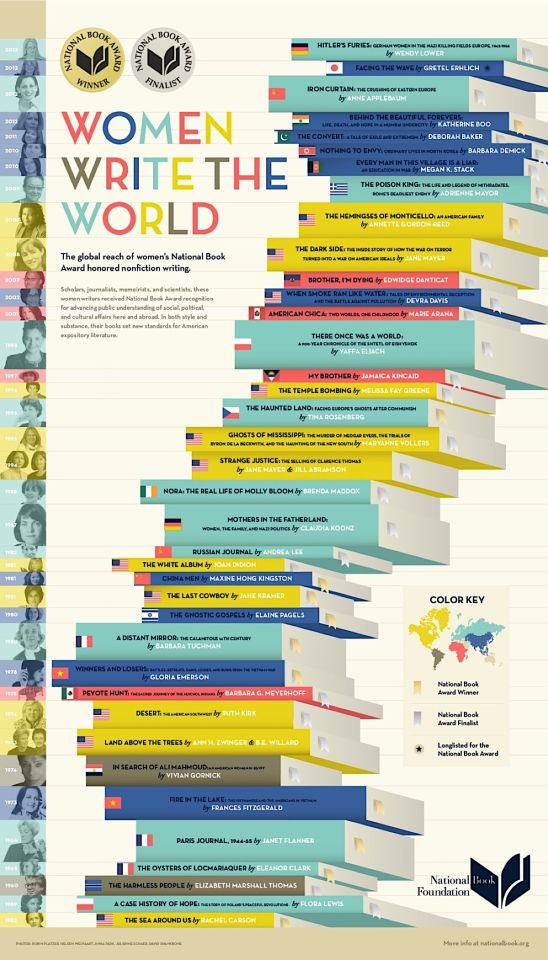
The list includes Tina Rosenberg, the author of The Haunted Land, a powerful and moving account of the challenges faced by Eastern European countries as they transitioned from communism to democracy.
Claudia Koonz was honored for Mothers in the Fatherland, a groundbreaking study of the role of women in Nazi Germany.
Barbara Tuchman received the 1980 National Book Award in History for A Distant Mirror. The book chronicles the 14th century in Europe, marked by the Black Death, the Hundred Years’ War, the Papal Schism, and numerous other disasters.
(via Women writers honored by the National Book Award (infographic))
17 notes
·
View notes
Photo
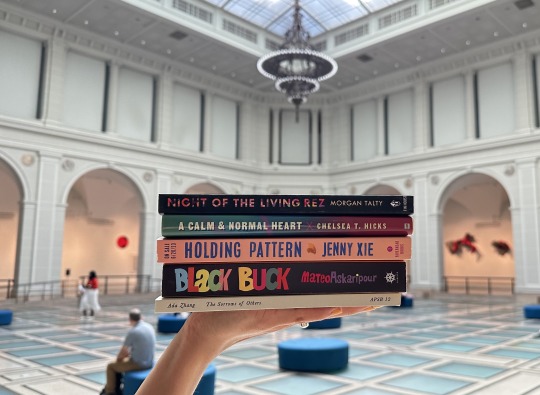
"Museums are complicated sources of inspiration: they house memories, the ones no longer owned and the ones whose owners are still here." —Morgan Talty, author of Night of the Living Rez
Click through to hear from 5 under 35 writers, Mateo Askaripour, Jenny Xie, Chelsea T. Hicks, Morgan Talty, and Ada Zhang, reflect on how museums fuel their creative work (and join us to celebrate them at the National Book Foundation’ first-ever 5 under 35 public ceremony on May 25)!
Photo: Kyle Thornburg
24 notes
·
View notes
Text
The National Book Award finalists have been announced.

2023 Longlist for the National Book Award for Fiction:
Nana Kwame Adjei-Brenyah, Chain-Gang All-Stars Pantheon Books / Penguin Random House
Aaliyah Bilal, Temple Folk Simon & Schuster
Eliot Duncan, Ponyboy W. W. Norton & Company
Paul Harding, This Other Eden W. W. Norton & Company
Tania James, Loot Knopf / Penguin Random House
Jayne Anne Phillips, Night Watch Knopf / Penguin Random House
Mona Susan Power, A Council of Dolls Mariner Books / HarperCollins Publishers
Hanna Pylväinen, The End of Drum-Time Henry Holt and Company / Macmillan Publishers
Justin Torres, Blackouts Farrar, Straus and Giroux / Macmillan Publishers
LaToya Watkins, Holler, Child Tiny Reparations Books / Penguin Random House
2023 Longlist for the National Book Award for Nonfiction:
Ned Blackhawk, The Rediscovery of America: Native Peoples and the Unmaking of U.S. History Yale University Press
Jonathan Eig, King: A Life Farrar, Straus and Giroux / Macmillan Publishers
Viet Thanh Nguyen, A Man of Two Faces: A Memoir, A History, A Memorial Grove Press / Grove Atlantic
Prudence Peiffer, The Slip: The New York City Street That Changed American Art Forever Harper / HarperCollins Publishers
Donovan X. Ramsey, When Crack Was King: A People’s History of a Misunderstood Era One World / Penguin Random House
Cristina Rivera Garza, Liliana’s Invincible Summer: A Sister’s Search for Justice Hogarth / Penguin Random House
Christina Sharpe, Ordinary Notes Farrar, Straus and Giroux / Macmillan Publishers
Raja Shehadeh, We Could Have Been Friends, My Father and I: A Palestinian Memoir Other Press
John Vaillant, Fire Weather: A True Story from a Hotter World Knopf / Penguin Random House
Kidada E. Williams, I Saw Death Coming: A History of Terror and Survival in the War Against Reconstruction Bloomsbury Publishing
2023 Longlist for the National Book Award for Poetry:
John Lee Clark, How to Communicate W. W. Norton & Company
Oliver de la Paz, The Diaspora Sonnets Liveright / W. W. Norton & Company
Annelyse Gelman, Vexations University of Chicago Press
José Olivarez, Promises of Gold Henry Holt and Company / Macmillan Publishers
Craig Santos Perez, from unincorporated territory [åmot] Omnidawn Publishing
Paisley Rekdal, West: A Translation Copper Canyon Press
Brandon Som, Tripas Georgia Review Books / University of Georgia Press
Charif Shanahan, Trace Evidence Tin House Books
Evie Shockley, suddenly we Wesleyan University Press Monica Youn, From From Graywolf Press
2023 Longlist for the National Book Award for Translated Literature:
Juan Cárdenas, The Devil of the Provinces Translated from the Spanish by Lizzie Davis Coffee House Press
Bora Chung, Cursed Bunny Translated from the Korean by Anton Hur Algonquin Books / Hachette Book Group
David Diop, Beyond the Door of No Return Translated from the French by Sam Taylor Farrar, Straus and Giroux / Macmillan Publishers
Jenny Erpenbeck, Kairos Translated from the German by Michael Hofmann New Directions Publishing
Stênio Gardel, The Words That Remain Translated from the Portuguese by Bruna Dantas Lobato New Vessel Press
Khaled Khalifa, No One Prayed Over Their Graves Translated from the Arabic by Leri Price Farrar, Straus and Giroux / Macmillan Publishers
Fernanda Melchor, This Is Not Miami Translated from the Spanish by Sophie Hughes New Directions Publishing
Pilar Quintana, Abyss Translated from the Spanish by Lisa Dillman World Editions
Astrid Roemer, On a Woman’s Madness Translated from the Dutch by Lucy Scott Two Lines Press
Mohamed Mbougar Sarr, The Most Secret Memory of Men Translated from the French by Lara Vergnaud Other Press
2023 Longlist for the National Book Award for Young People’s Literature:
Erin Bow, Simon Sort of Says Disney-Hyperion Books / Disney Publishing Worldwide
Kenneth M. Cadow, Gather Candlewick Press
Alyson Derrick, Forget Me Not Simon & Schuster Books for Young Readers / Simon & Schuster
Huda Fahmy, Huda F Cares? Dial Books for Young Readers / Penguin Random House
Vashti Harrison, Big Little, Brown Books for Young Readers / Hachette Book Group
Katherine Marsh, The Lost Year: A Survival Story of the Ukrainian Famine Roaring Brook Press / Macmillan Publishers
Dan Nott, Hidden Systems: Water, Electricity, the Internet, and the Secrets Behind the Systems We Use Every Day Random House Graphic / Penguin Random House
Dan Santat, A First Time for Everything First Second / Macmillan Publishers
Betty C. Tang, Parachute Kids Graphix / Scholastic, Inc.
Yohuru Williams and Michael G. Long, More Than a Dream: The Radical March on Washington for Jobs and Freedom Farrar, Straus and Giroux Books for Young Readers / Macmillan Publishers
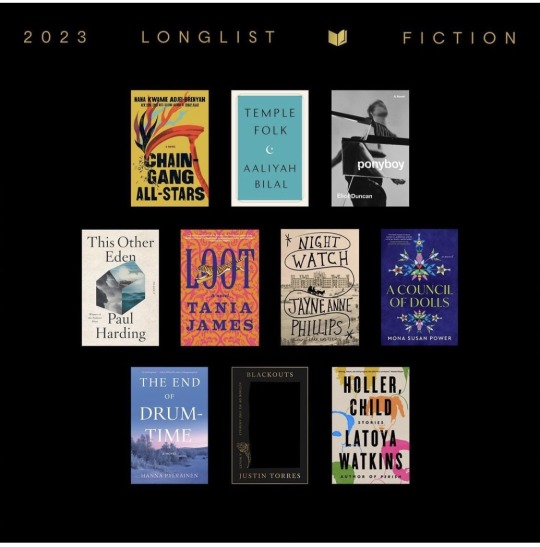
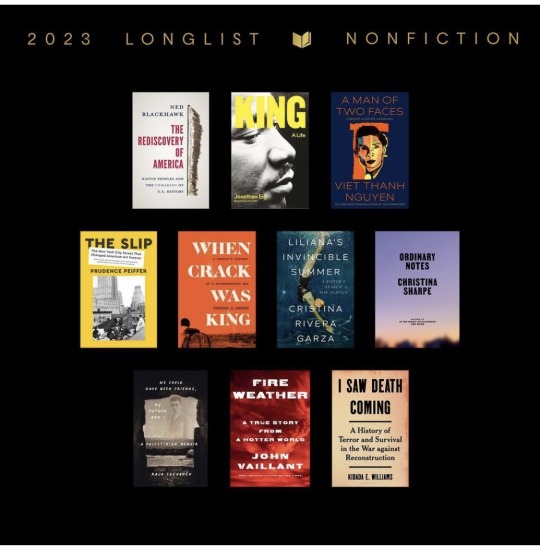
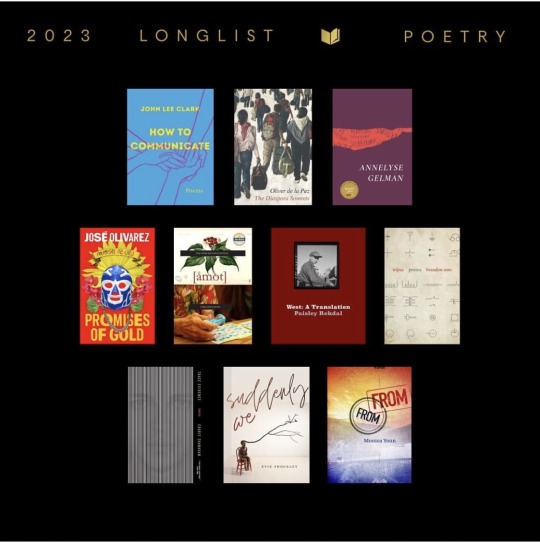
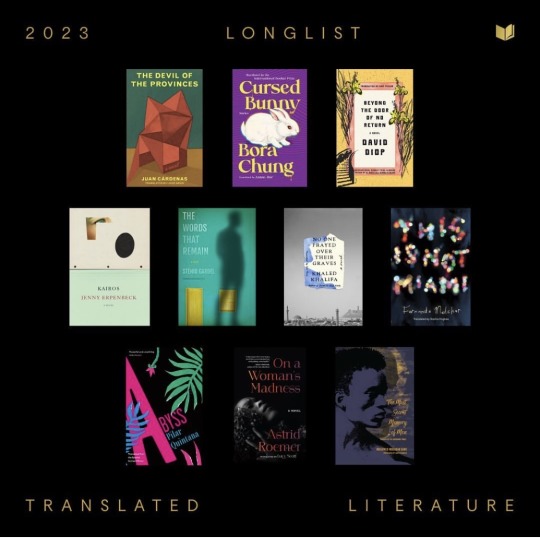

3 notes
·
View notes
Photo
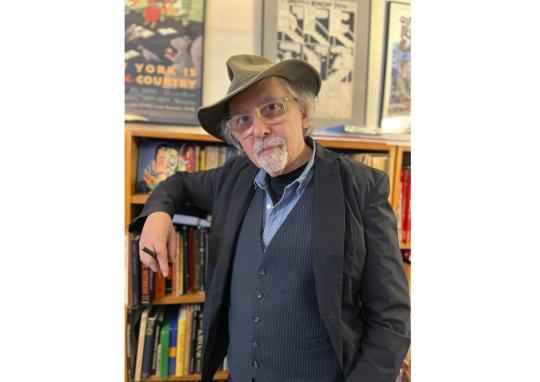
The National Book Foundation will present a lifetime achievement award to Maus creator Art Spiegelman in November — the organization’s 2022 Medal for Distinguished Contribution to American Letters, which has never been given to a comics artist before.
Read more
#national book foundation#medal for distinguished contribution to american letters#art spiegelman#maus
8 notes
·
View notes
Text
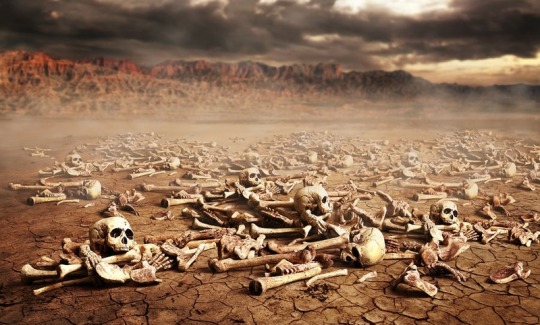
A Valley of Dry Bones
1 The LORD took hold of me, and I was carried away by the Spirit of the LORD to a valley filled with bones. 2 He led me all around among the bones that covered the valley floor. They were scattered everywhere across the ground and were completely dried out. 3 Then he asked me, “Son of man, can these bones become living people again?”
“O Sovereign LORD,” I replied, “you alone know the answer to that.”
4 Then he said to me, “Speak a prophetic message to these bones and say, ‘Dry bones, listen to the word of the LORD! 5 This is what the Sovereign LORD says: Look! I am going to put breath into you and make you live again! 6 I will put flesh and muscles on you and cover you with skin. I will put breath into you, and you will come to life. Then you will know that I am the LORD.’”
7 So I spoke this message, just as he told me. Suddenly as I spoke, there was a rattling noise all across the valley. The bones of each body came together and attached themselves as complete skeletons. 8 Then as I watched, muscles and flesh formed over the bones. Then skin formed to cover their bodies, but they still had no breath in them.
9 Then he said to me, “Speak a prophetic message to the winds, son of man. Speak a prophetic message and say, ‘This is what the Sovereign LORD says: Come, O breath, from the four winds! Breathe into these dead bodies so they may live again.’”
10 So I spoke the message as he commanded me, and breath came into their bodies. They all came to life and stood up on their feet—a great army.
11 Then he said to me, “Son of man, these bones represent the people of Israel. They are saying, ‘We have become old, dry bones—all hope is gone. Our nation is finished.’ 12 Therefore, prophesy to them and say, ‘This is what the Sovereign LORD says: O my people, I will open your graves of exile and cause you to rise again. Then I will bring you back to the land of Israel. 13 When this happens, O my people, you will know that I am the LORD. 14 I will put my Spirit in you, and you will live again and return home to your own land. Then you will know that I, the LORD, have spoken, and I have done what I said. Yes, the LORD has spoken!’”
Reunion of Israel and Judah
15 Again a message came to me from the LORD: 16 “Son of man, take a piece of wood and carve on it these words: ‘This represents Judah and its allied tribes.’ Then take another piece and carve these words on it: ‘This represents Ephraim and the northern tribes of Israel.’ 17 Now hold them together in your hand as if they were one piece of wood. 18 When your people ask you what your actions mean, 19 say to them, ‘This is what the Sovereign LORD says: I will take Ephraim and the northern tribes and join them to Judah. I will make them one piece of wood in my hand.’
20 “Then hold out the pieces of wood you have inscribed, so the people can see them. 21 And give them this message from the Sovereign LORD: I will gather the people of Israel from among the nations. I will bring them home to their own land from the places where they have been scattered. 22 I will unify them into one nation on the mountains of Israel. One king will rule them all; no longer will they be divided into two nations or into two kingdoms. 23 They will never again pollute themselves with their idols and vile images and rebellion, for I will save them from their sinful apostasy. I will cleanse them. Then they will truly be my people, and I will be their God.
24 “My servant David will be their king, and they will have only one shepherd. They will obey my regulations and be careful to keep my decrees. 25 They will live in the land I gave my servant Jacob, the land where their ancestors lived. They and their children and their grandchildren after them will live there forever, generation after generation. And my servant David will be their prince forever. 26 And I will make a covenant of peace with them, an everlasting covenant. I will give them their land and increase their numbers, and I will put my Temple among them forever. 27 I will make my home among them. I will be their God, and they will be my people. 28 And when my Temple is among them forever, the nations will know that I am the LORD, who makes Israel holy.”
— Ezekiel 37 | New Living Translation (NLT)
Holy Bible, New Living Translation, copyright © 1996, 2004, 2015 by Tyndale House Foundation. All rights reserved.
Cross References: Genesis 2:7; Exodus 6:3; Numbers 17:2-3; Deuteronomy 32:39; Psalm 88:5; Isaiah 11:13; Isaiah 32:15; Isaiah 43:5-6; Jeremiah 3:18; Jeremiah 13:5; Jeremiah 30:19; Ezekiel 11:18; Ezekiel 12:9; Hosea 13:14; Matthew 23:17; John 1:14; John 3:8; John 10:16; John 12:34; Acts 8:39; 1 Corinthians 15:35; Titus 2:14; Hebrews 13:20; Revelation 7:15; Revelation 10:11; Revelation 11:11; Revelation 21:3
#Valley of Dry Bones#reunion of Israel and Judah#One Nation with One King#the Lord sanctify's Israel#the Lord's sanctuary is among Israel#Ezekiel 37#Book of Ezekiel#Old Testament#NLT#New Living Translation Bible#Tyndale House Foundation
12 notes
·
View notes
Text
oof i need to watch foundation i need to go back to my ROOTS
#btw is the robots/foundation nation a thing here like the dune nation#i need nations for all the niche sci-fi and fantasy books i read when i was younger which are not many#but definitely took up all the space in my brain at some point in my teenage years
10 notes
·
View notes
Text
With a cover date of January, 1991, Marvel released a one shot in association with the National Association of School Nurses as part of the Epilepsy Foundation of America's campaign "Count Me In". ("Spider-Man Battles the Myth Monster!", Comic, Event)
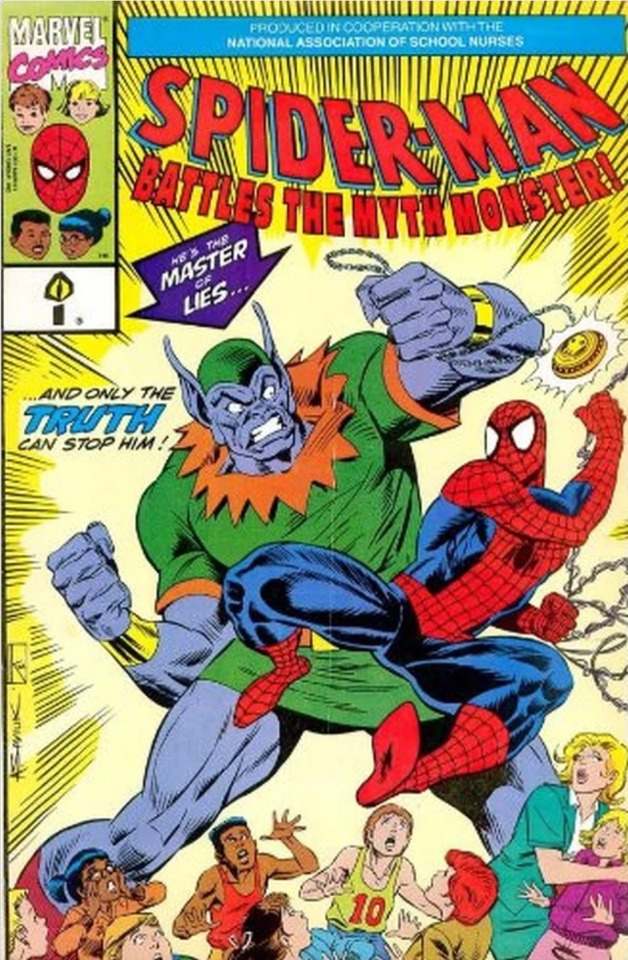
#nerds yearbook#real life event#first appearance#comic book#marvel comics#marvel#january#1991#danny fingeroth#jose delbo#spider man#myth monster#king arthur#merlin#epilepsy#national association of school nurses#camelot#count me in#epilepsy foundation of america
7 notes
·
View notes
Text
We are moving forward to a better future where every student—whether Black, brown, or white, Native or newcomer, LGBTQ+ or differently abled—has the #freedomtolearn.“ 🤔 Which group is missing? It’s women.
WASHINGTON—The nation’s largest union, the National Education Association, will lead a national day-long crusade against right-wing censorship, book-banning, pressure on schools and librarians, and even an occasional book burning, on a “Freedom to Learn and Teach Truth” day of action on June 10.
And it won’t be just rallies. Indeed, in the epicenter of censorship and book bans—Florida, where else?—“Teaching Truth” features a timeline of the long history of the civil rights struggle there, with historical vignettes about everything, positive and negative.
That timeline includes “the nation’s first-ever statewide teachers strike,” when 27,000 members of the Florida Education Association, protesting segregated schools and worse, handed in resignation letters on Feb. 19, 1968—and walked out. But that strike’s not in Sunshine State history books.
“All students benefit when we are empowered to teach the truth, share diverse stories and build inclusive, supportive schools,” declared NEA President Becky Pringle in announcing the events.
“Join us on June 10, 2023, to ensure our public schools meet the needs of all students—no exceptions,” Pringle, a Philadelphia science teacher, tweeted.
All the day of action events are on the Zinn Education Foundation’s website: www.zinnedproject.org.
The events occur against a backdrop of rising censorship of books by right-wingers, “parents” egged on by talk radio screamers, and pressure from white nationalists, and their political puppets. Their targets are any books and school and college courses that don’t agree with their White ethnocentric prejudices.
Tactics include book bans, threats against teachers and librarians who dare discuss “taboo” topics, and even an occasional book bonfire in the South, reminiscent of Nazi Germany in the 1930s.
“Some politicians are trying to censor the lessons taught in our classrooms, ban books, and exclude certain kids based on what they look like or where they live,” event sponsors, led by the NEA and the progressive Zinn Foundation, said.
“They’re trying to divide and distract us from their failures to provide all of our kids everything they need to learn, grow, and thrive. But together we can make our voices loud and clear to protect the freedom to learn and teach truth.
“We are moving forward to a better future where every student—whether Black, brown, or white, Native or newcomer, LGBTQ+ or differently abled—has the #freedomtolearn.”
NEA, other teachers, librarians, and their allies must contend with zealotry producing a lengthening list of banned books, just as zealotry led to anti-Communist hysteria in the 1950s.
Now, books about LGBT people are thrown away. Teaching Black history is forbidden, especially in Florida. Even the biography of the late, great baseball Hall of Famer Roberto Clemente, a Hispanic-American icon in Puerto Rico for his talent and humanitarianism, is pulled from the shelves.
So the NEA, the Zinn Educational Foundation, and their allies are fighting back, with the national events.
They have widespread popular support and mean to show it, defying censorious bluenoses.
All but two of the events below are on June 10. Times and sites vary. Besides the long historic timeline just in Florida, others included:
The U.S. Hispanic Leadership Institute, the Chicago Teachers Union (AFT), and the NEA will join city civil rights and civic leaders for a 9 am program and speeches at the National Museum of Mexican Art at 1852 West 19th in the Pilsen neighborhood.
The 1977 Bookstore, the Southern Poverty Law Center, and the American Civil Liberties Union will host a “banned book” giveaway in Montgomery, Ala. They’re adding a discussion on “redlining,” the common banking practice—North and South—that prevented Blacks from buying homes in white neighborhoods.
Este Inc., and the Fight Back Collective plan a rally in Los Angeles at the Ruben F. Salazar Park, the site of the historic 1970 Chicano Moratorium against the Indochina War, which saw 20,000 people march. Speakers will discuss the movement.
The Possible Futures Bookstore and the Anti-Racist Teaching and Learning Collective in New Haven, Conn., plan a story time reading of And Tango Makes Three, a children’s book “celebrating queer parents and caregivers.” Attendees get free copies.
C. hosts two events. The first features speakers and pledges by teachers to uphold the freedom to read and learn and a banned books display, all at the African-American Civil War Memorial. A “Songs of the Living Community Sing” at the All Souls Unitarian Church will occur in the evening. It’s one of the few events where reservations are required.
Floridians will defy their censorious and homophobic right-wing Republican governor, Ron DeSantis, with four events. Two support LGBT people. The first will be at Fort Lauderdale’s Stonewall National Museum, named after New York City’s gay nightclub, the Stonewall Inn. The second will be a twilight march in Miami sponsored by PRISM.
Floridians also will honor the historic Black community in Rosewood, massacred on Jan. 1, 1923. St. Augustine residents plan a talk and historical walk honoring participants in the 1964 St. Augustine movement of the Southern Christian Leadership Conference.
Georgia will host a public reading of the children’s book That Flag about two girls, one Black, one white, who live across the street from each other and how they deal with the issue of the Confederate flag, which until 2013 was part of the state flag. The reading will be in Stone Mountain Park, near the massive monument—think Mount Rushmore—to Confederate leaders.
In Kansas City’s Quindaro Park, “local educators will speak on the importance for young people of learning to think critically and to get a full understanding of U.S. history.” The event includes fundraising for historic Quindaro and “sharing books by Black, Indigenous, Latinx, and Asian American authors, including books by LGBTQ authors or on LGBTQ themes.”
New York City hosts five events, with four more in Princeton, Morristown, Newark, and Red Bank, N.J. “Banned books” will be given away at the city Board of Education offices in the Bronx and a “banned book nook” and poetry readings is planned at the Hattie Carthan Playground in Brooklyn. The Stonewall Inn in Manhattan hosts an afternoon teach-in on LGBT rights. Other events were on June 9 and June 12.
Philadelphians added an extra cause to their event, at the President’s House on Independence Mall. A wide range of groups will sponsor readings, discussions, art, and more. And organizers are urging “participants to also attend the Chinatown Rally earlier in the day to protest the proposed stadium” for basketball which would decimate the city’s Chinese community.
#June 10#Freedom to Learn and Teach Truth#National Education Association#Zinn Education Foundation#Interesting that they forgot about all the challenged books that dealt with menstruation and information about reproduction
3 notes
·
View notes
Text
Duolingo is NOT what it used to be.
“Duolingo is ‘sunsetting the development of the Welsh course’ (and many others)”.
I’ve used Duolingo since 2013. It used to be about genuinely learning languages and preserving endangered ones. It used to have a vibrant community and forum where users were listened to. It used to have volunteers that dedicated countless hours and even years to making the best courses they could while also trying to explain extremely nuanced and complex grammar in simple terms.
In the past two years it feels like Von Ahn let the money talk instead of focusing on the original goal.
No one truly had a humongous problem with the subscription tier for SuperDuolingo. We understood it: if you can afford to pay, help keep Duolingo free for those who couldn’t.
It started when the company went public. Volunteers were leaving courses they created because they warned of differing longterm goals compared to Duolingo’s as a company; not long after it was announced that the incubator (how volunteers were able to make courses in the first place) would be shut down. A year goes by and the forums—the voice of the users and the way people were able to share tips and explanations—is discontinued. A year or two later, Duolingo gets a completely new makeover—the Tree is gone and you don’t control what lesson you start with. With the disappearance of the Tree, all grammar notes and explanations for courses not in the Big 8 (consisting of the courses made before the incubator like Spanish/French/German/etc. and of the most popular courses like Japanese/Korean/Chinese/etc.) are removed with it. Were you learning Vietnamese and have no idea how honorifics work without the grammar notes? Shit outta luck bud. Were you learning Polish and have absolutely no clue how one of the declensions newly thrown at you functions? Suck it up. In a Reddit AMA, Von Ahn claims that the new design resulted in more users utilizing the app/site. How he claims that statistic? By counting how many people log into their Duolingo account, as if an entire app renovation wouldn’t cause an uptick in numbers to even see what the fuck just happened to the courses.
Von Ahn announces next in a Reddit AMA that no more language courses will be added from what there already is available. His reasoning? No one uses the unpopular language courses — along with how Duolingo will now be doing upkeep with the courses already in place. And here I am, currently looking on the Duolingo website how there are 1.8 million active learners for Irish, 284 thousand active learners for Navajo, and even 934 thousand active learners for fucking High Valyrian. But yea, no one uses them. Not like the entire Navajo Nation population is 399k members or anything, or like 1.8 million people isn’t 36% of the entire population of Ireland or anything.
And now this. What happened to the upkeep of current courses? Oh, Von Ahn only meant the popular ones that already have infinite resources. Got it. Duolingo used to be a serious foundational resource for languages with little resources while also adding the relief of gamification.
It pisses me off. It really does. This was not what Duolingo started out as. And yea, maybe I shouldn’t get invested in a dingy little app. But as someone who spent most of her adolescence immersed in language learning to the point where it was literally keeping me alive at one point, to the point where languages felt like my only friend as a tween, and to the point where friendships on the Duolingo forums with likeminded individuals my age and other enthusiasts who even sent me books in other languages for free because they wanted people to learn it, the evolution of Duolingo hits a bitter nerve within me.
~End rant.
#duolingo#langblr#huge language rant feel free to skip#evolution of duolingo#luis von ahn#duolingo welsh course#language learning
17K notes
·
View notes
Text
Americans eager to pursue such research were thrown back upon the resources of state universities, which at the time were willing to invest little in the field, or upon what between the wars was the principal patron of the science in the United States, the Rockefeller Foundation, which was something of a private precursor to the National Science Foundation and National Institutes of Health combined.
"In the Name of Eugenics: Genetics and the Uses of Human Heredity" - Daniel J. Kevles
#book quote#in the name of eugenics#daniel j kevles#nonfiction#american#eager#research#genetics#scientific research#limited resources#state university#investment#patron#united states#rockefeller foundation#precursor#private funding#national science foundation#national institutes of health
0 notes
Text
In September 2001 several organizations, including the National Institutes of Health, Pfizer pharmaceuticals, and the New York Times Company Foundation, organized expert panels to recommend the best treatments for people traumatized by the attacks on the World Trade Center.
"The Body Keeps the Score: Mind, brain and body in the transformation of trauma" - Bessel van der Kolk
#book quotes#the body keeps the score#bessel van der kolk#nonfiction#9/11#september 11#september 11 2001#world trade center#national institutes of health#pfizer pharmaceuticals#new york times company foundation#trauma#ptsd treatment
0 notes
Text
Werewolf: the Apocalypse 5th Edition and the Anti-Indigeneity in the Gaming Industry
reosted with permission from J.F. Sambrano
Dagot’ee!
Shii J.F. Sambrano gonsēē. My nations are Chiricahua Apache (Ndeh) through my maternal grandmother and Cora Indian (Náayarite) through my maternal grandfather. I am a mixed race Indigenous person, and through my father my heritage is English and Scottish. I am currently residing and doing work in my community on the lands of Lummi Nation. I use both gender non-binary and masculine pronouns, but prefer the former. I have several published works in the TTRPG industry, and am probably most known for my contributions to Mage: the Ascension 20th Edition, Werewolf: the Apocalypse 20th Edition, and the Transformers Roleplaying Game, as well as being part of the Essence 20 development team. Further, I also work in higher education at an Indian college, both advising and teaching Indigenous students across the United States. My passion is education, and I believe that we all learn through play, and that TTRPGs are a valuable source of learning, especially on personal, cultural, and social levels. This has always been what has drawn me to TTRPGs since I started playing M.E.R.P. with my brother in 1996 (and before that HeroQuest), through to my “graduation” into more story-driven games such as those presented in the Storyteller System, until now, where I author and produce my own roleplaying games.
I was also part of the First Team (in-joke intentional) hired by White Wolf Studios/Paradox Interactive via Hunters Entertainment to develop and author Werewolf: the Apocalypse 5th Edition. After several months of work, Paradox Interactive chose to go in another direction in early 2021 (I believe it was either March or April) and in fall of that year, it was announced that Werewolf would instead be taken in house, with Justin Achilli as the Brand Creative Lead and primary author of the book. Going forward I will be describing my experience while I worked with Paradox Interactive, primarily through Karim Muammar, White Wolf’s Brand Editor, as well as the developmental editor for Werewolf. Although I worked in a team, both with hired authors and in-house representatives at Hunters Entertainment, I will not be speaking for the experience of others, except when specifically noting unanimous consensuses, and specific interactions (which will go unnamed) that are particularly relevant. My hope is that by highlighting some of the anti-Indigenous attitudes that are central to the foundational members and leaders of the White Wolf brand, that I can provide opportunities for growth and healing within the World of Darkness TTRPG community, but also in the broader gaming community, where these behaviors and attitudes are rampant. I also want the community to have a better understanding of what this experience is like internally, and the challenges that Indigenous creators, as well as other marginalized creators, are met with when they try to make positive change within nerd and geek communities clinging to inherited white supremacist values, even if they don’t realize they are doing so.
What I do not want to be doing in this article is creating fuel for edition wars. I believe that both legacy and Werewolf 5th are rife with anti-Indigenous attitudes, and appalling amounts of appropriation. Both versions deserve criticism, I am not defending one over the other, I am only sharing what my experience was like working on the 5th edition of the book. Further, please understand that I was originally going to wait until I had read the final copy of the book, because I wanted to know how much of my work was used (based on previews I already know some was, just not the extent) and whether or not they decided to credit me for that work, and how I was going to be credited. My belief is that I likely will not be, but I am genuinely uncertain. Knowing how they handled that would have reframed how I addressed this. But more importantly, I want it to be very clear that even before Paradox ultimately pulled the plug on the Hunters team, I was preparing to exit working on the project based on the experience I will describe below. Not only did I find it frustrating, and personally disparaging, but I ultimately decided I was uncomfortable with my name being attached to the product based on the direction they wanted to go. So while I wanted to know whether or not I would be credited, because it would teach me something about their internal practices, I do not want or need the credit.
Finally, the reason that I decided to speak about this now instead of after having a chance to inspect the final product, was because my personal experience dealing with anti-Indigeneity coming from Paradox was just that: personal. But since then I have witnessed a throughline of hateful and xenophobic attitudes wielded against Indigenous people across the globe, and we do not deserve this treatment. I was outraged over the events that led to the segregation of the Latin American fanbase, which culminated from bottom-up criticism about how poorly their people and countries were being defined through World of Darkness products, and ended up with the firing of their Latin American Brand Ambassador, Alessa Torres, because she chose to stand with her community in those criticisms. I was further appalled when the likeness of Tāme Wairere Iti was shoehorned into the Werewolf book, a blatant example of cultural theft: not only in stealing the literal physical identity of an Indigenous person, but also his sacred tā moko. When Paradox Interactive issued an apology for this, it felt incredibly hollow to me in the wake of these events, the hateful attitudes I had personally witnessed coming from the top.
Whether from North America, Mexico, Brazil, Argentina, or Peru, or across the globe in New Zealand, not only do Indigenous people deserve better treatment from such a major company, but their Indigenous and Latino fanbases, who have twisted and worked themselves through difficult representation for decades at this point, deserve better. Apologies are not enough, especially when they come with next to no real change.
Werewolf: the Apocalypse in Context
At the time that White Wolf Publishing began to produce its World of Darkness line, the TTRPG industry was dominated by white men, both as producers, developers, and authors, as well as the main characters in their settings. White Wolf's World of Darkness made an impact at the time, by defying these Eurocentric, patriarchal presentations, first by defaulting to feminine pronouns throughout Vampire: the Masquerade, and then by focusing on Indigenous representation and values in Werewolf: the Apocalypse, and as a young Indigenous nerd, it had a positive impact on me, as I know it has on some other Indigenous people who became fans of the World of Darkness at the time. This was because before opening the pages of Werewolf: the Apocalypse, I had never seen heroes that I could play who looked like me and my culture. It was off, and often offensive, but it was my first experience in which I could directly play a hero who shared my heritage--and I also had more than one option through two different Tribes to do so. This might sound a little like I was cheering for table scraps, but again, at the time, table scraps was more than I had ever seen before.
Werewolf: the Apocalypse 1st Edition was originally published in 1992 via then White Wolf Publishing (not to be confused with Paradox Interactive's White Wolf). From its inception, the premise was interwoven with what its then-authors believed to be Indigenous praxis and representation. Like many pop-culture presentations of Indigeneity from this time period (see Fern Gully, Dances With Wolves, Disney’s Pocahontas, or in TTRPGs, the NAN from Shadowrun) it was rife with problematic and even offensive stereotyping. The most obvious examples thereof are within the two "Pure Tribes" Uktena, and W****** who I will henceforth refer to as Older and Younger Brother. However, Indigenous inspiration was at the core of the game's spiritual premise as well, where animism and "Totems" are central to the setting and gameplay. The way these concepts are presented is trivializing and dehumanizing, but it is important to acknowledge that the appropriation present in Werewolf: the Apocalypse goes a lot deeper than the two Brother Tribes (even the term "Tribe" was meant to invoke a vision of Indigeneity compared to the previous setting in the line's use of "Clan"). Additionally, there is art throughout every generation of these gaming books that represents humans, wolves, and human-wolf hybrid forms wearing Indigenous regalia, including sacred items such as headdresses, or engaged in sacred rituals such as the Sun Dance. The list of problematic representations goes deep, and my examples only scratch the surface, but it is also important for me to note the positive impact that this had, particularly in the 90's.
Even though the primary contributors to these narratives were non-Indigenous authors, or in one case, a Pretendian, and another, a culturally disconnected author, by the time the Revised (or Third Edition) era of the books came around, White Wolf Publishing was actively engaged in cultural consultation. While I do not believe cultural consultation makes a big difference on its own, it matters that the attempt was made, to a degree: while these efforts fall short of what needs to be seen in cultural representation, this was still ahead of most other gaming companies at this time.
Hired by Hunters Entertainment
In February of 2020 I was approached by one of the co-owners of Hunters Entertainment to be one of the primary authors for Werewolf: 5th Edition due to my work on other World of Darkness projects, and let's be honest, because I was capable of bringing a much needed Indigenous perspective to a gameline that was rooted in Indigeneity and rotting with appropriation and racist stereotypes. I was overall receptive to the invitation, largely because I was very passionate about the World of Darkness setting overall, and Werewolf in particular, due to the impact that 90's representation had on me when I was a younger gamer. I also felt hopeful that with a really hard rewrite of Indigenous aspects of the game that I could shift a lot of really painful aspects of the game into something that was a net positive for Indigenous representation. I will tell you now, more than anything, I was excited to rewrite the Younger Brother Tribe, because when separated from racist authors, their message is very empowering and real to my lived experience.
That said, I did not agree to join the project without first asking for reassurances. I said that I was not willing to write negative Native stereotypes. I would not use appropriative language, or generally engage in appropriative writing (which meant at minimum that the names of the Pure Tribes would need to change), and most importantly, that I would not not engage in writing that contributed to erasure. While the person who recruited me to work on the project was eager to work with me, he acknowledged that he was not sure he could get everything I wanted to see approved, but also promised to fight for everything I suggested as hard as he could. Additionally, he shared with me that the original setting pitch for W5 involved all of Younger Brother being slaughtered en masse in a massacre. I made it clear that this was exactly the kind of thing that I would not write. I cannot remember if this was something he suggested to be changed before or after I was invited onto the project, but with some pushback it was changed. However, I point this out because I want you, the reader, to understand how eager Paradox Interactive was to start with mass genocide and erasure as a foundation to the setting. All that said, I cannot stress enough that I have had nothing but positive experiences with Hunters Entertainment, and none of the following concerns fall upon them.
The Sword of Heimdall
The first encounter the Hunters Entertainment team as a whole had with problematic guidelines for the W5 draft was the direction that Paradox Interactive wanted to go with the Sword of Heimdall. At the time, the suggestions from Paradox and Karim Muammar were that the Sword of Heimdall was going to represent the new major villain of the Werewolf setting, and that they were to also represent the far-right, fascist direction that Werewolf society so often turned toward. They were meant to be representative of how far the new concept of Hauglosk could take entire communities. However, the Sword of Heimdall was discussed interchangeably with the Get of Fenris as a whole, and more than once Muammar seemed to suggest that every member of this Tribe was guilty of the same attitudes espoused in previous editions from the Sword of Heimdall. Now let's not beat around the bush: the Sword of Heimdall are literal Nazis. They believe directly in white supremacy and don't shy from it. They wanted to cleanse impure elements from the Get of Fenris, including BIPOC people, other non-white ethnicities, women, neurodivergent Garou, and other disabled Garou.
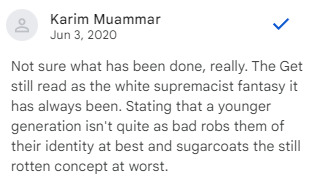
The writing team found this approach problematic for several reasons. The first, and most obvious, was that the direction seemed to want to turn one of the most popular Tribes into a horrific stereotype of its most abhorrent faction. Whether or not Muammar’s goal was to turn them into villains, we could not imagine a world where fans of previous editions would get their hands on this book, and not look for a way to play one of their previous favorite groups, thus creating the issue of making a guide to playing Nazi. Even beyond that, it’s not as if historically there were not players who used the tools of the setting to play Black Spiral Dancers, why wouldn’t this draw people who actually wanted to role-play through these toxic, harmful politics? Further, and while this is less important, it left a bad taste in my mouth, the justification for this major shift in Werewolf lore seemed to change over each pass. At first, Muammar suggested that all Fenrir were Nazis/SoH. Then, when he was provided with evidence that it was a small faction that was eliminated in the early 2000’s, he started to shift toward the idea that we should not follow the lore. Finally, when every single member of the writer’s team flatly refused to provide what would essentially be “a player’s guide to being a Nazi werewolf” the writing was on the wall about the end of our involvement with this product. More than once, he suggested that we were cowardly social justice warriors for being unwilling to work with this concept, even though there were several attempts to write a heroic version of the Fenrir that were focused on undoing these ills of the past.
Indigenous Erasure in Werewolf: 5th Edition
While the entire Hunters Entertainment writing team was handling the major, glaring issue of Paradox’s fervor to include a major Nazi element in Werewolf, I was personally dealing with the problematic approach to the Indigenous issues in the setting. The largest problem, for me, was in addressing Younger Brother’s issues, the history of non-Indigenous writers creating horrifically racist stereotypes, and what was valuable in the Tribal identity that should be saved and recentered. However, my attempts to do so were thwarted with every approach. I rewrote this Tribe four times, and offered three different versions of it to try to earn approval for a final write-up, but each time there was a lot of negativity directed towards my attempts and all them boiled down to this: Muammar felt that having two Tribes (both Younger and Older Brother) representing the “Indigenous population” was too many, and wanted them to only be focused on Older Brother, and that Younger Brother’s connection to a central, Indigenous identity, was undesirable because “other sources wrote them as having Siberian and European connections” and that future writing on this Tribe would require a lot of sensitivity…suggesting that one, Muammar wasn’t interested in doing the work to handle that level of sensitivity, and further, that he wasn’t interested in including me in future work, since I was involved with doing that at the time.

I want to take a moment to remind you that the work that was put into recovering Younger Brother started with “Let’s Kill Them Off” and at this point, through a combination of convincing and pleading, had been walked back to “They can live, but now they’re not connected to being Indigenous anymore” which is just representative genocide of a different variety. “Kill the Indian in him, and save the man.” It was also explicitly something I said I would not write about going into this project. Ultimately, my efforts did not get much further than this, with some specific exceptions I will cite below.
Karim Muammar’s Anti-Indigenous Positions
Muammar consistently and repeatedly communicated to the team in ways that were condescending and dismissive of our collective accomplishments and capabilities, but from my perspective, no one suffered as much significant derision as I did while discussing the changes I wanted to make to Younger and Older Brother in order to make their representation empowering and exciting.
In the pulled quote from the previous paragraph, I want to point out to you that Muammar, who had the title of Lead Editor on this project, refused to capitalize Native American. Further, he would often redline my work with edits to decapitalize my own uses of Native American, as well as the word Indigenous when referring to Indigenous peoples. While there are plenty of people who might want to argue about this, I will point out that both the AP style guide as well as the Chicago style guide (the one which I am most familiar with in my academic historical work) both call for Indigenous to be capitalized when referring to a people. Further, I challenge anyone to defend the consistent decapitalization of Native American. More importantly, the reason that these are standards in respected style guides, is because the English language has been used historically to oppress and erase ethnic identities, including Indigenous identities. By transforming adjectives into proper nouns, we are declaring that Indigenous and Native aren’t descriptors that can be applied to animals, plants, and soil, but real lived identities and culture groups.
When I was explaining to the Paradox team (which was mostly just Muammar) why it was important to change the names of these two Tribes from the appropriative (and offensive) ones used in the past, Muammar pushed back by defending the previously used Younger Brother name, even after reading my extensive research and explanation about how this would harm Indigenous communities and fans.
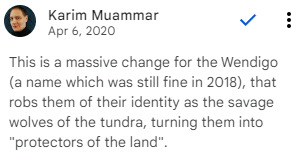
While doing so, he also decided that it was appropriate to refer to this entirely Native American tribe by the word “savages” a slur that has been specifically used to dehumanize Native Americans, and then mocked my rewrite that focused on presenting them as stewards of the land using Indigenous methodologies and praxes, instead of the “savage” racist stereotypes they were presented as in previous editions. Further, as in the above quote, even after it was communicated that the use of this term was problematic, he kept doubling-down to use it to refer to the Tribe.
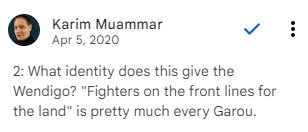
Even though I worked hard to redefine Younger Brother through Indigenous theory, such as place-based theory, relational theory, and communal theory, Muammar either refused to recognize this work, dismissing it as simple, or else simply could not understand the importance of these changes. Either way, the choice is that he didn’t want them to change, or couldn’t comprehend why the change was important because of how entrenched in white supremacist thinking he is. Further, after the massive effort that I put forward to attempt to educate him and the rest of the Paradox team on these issues, the insistence on using offensive terms and belittling my work felt intentional. So let’s talk about the work I did that was above and beyond my job description: free cultural consulting work.
“Sensitivity” and Consultation
I have seen several misunderstandings of my role working on this project going around, so I want to make something very clear. I was hired to work on this project as an author, and nothing else. I was not ever hired to be a cultural consultant. I do not do cultural consulting work. While I feel that there are many creators and companies who hire cultural consultants with the best intentions in mind, their responses often fall short of what is needed, as no one is ever obligated to actually follow the advice of cultural consultants. Further, I think there are also many companies who choose to hire cultural consultants only to say “we did this minimal step, and that is enough” in order to ward off naysayers.
However, anyone who hires me gets some level of cultural consulting for free, because it comes out in my writing–in both what I won’t write and what I choose to center my writing around. In the case of Werewolf 5th Edition, however, it was far more involved than this. I came with a plethora of “I will not write X” because I knew the setting was so problematic. A short list of my demands besides not being willing to write Indigenous erasure, was that we needed to change the names of the Pure Tribes (and the term Pure Tribe itself), we needed to change the word Totem to Patron, and also the Patrons of the Pure Tribes. We needed to move away from the term Metis for obvious reasons, and we needed to move away from the term Skin Dancers. I also specifically noted that there was a lot of cultural theft happening from the beginning of Werewolf until now that I wanted to address. The only way these issues were going to be addressed was to convince Paradox they were actual issues on the level of PR concerns, because nothing else was likely going to be considered. So in order to achieve this, I put in weeks worth of research, writing, and meetings with top level administrators with Hunters Entertainment so that they could bring this information to Paradox. I never documented my hours, but I would guess that I did approximately 80-100 hours of what I could only describe as cultural consultation work for free that was outside the contract work I was hired for. Let’s be clear: I did this willingly because I was passionate about the positive changes I wanted to see in this product, because I believed that Werewolf’s historic ills could be turned toward non-toxic representation.
Besides my actual words, such as naming the Ghost Council, and arguably the name Gale Stalkers came from a combination of names I pitched to Paradox after Winter’s Teeth was denied, and several sentences and paragraphs that I have seen so far that appear so close to what I originally wrote that you could imagine they were just edited versions, my largest contribution toward the final version of Werewolf: 5th Edition was this work. The only reason the offensive, appropriated names were changed were because of hours of my work to convince them it needed to happen. The reason that the Gale Stalkers aren’t just dead and gone: again, I pushed against this. The reason that Skin Dancers, Totem, and Metis will not appear as canonical titles? I pushed against their unwillingness to alter these things (see Karim’s defense of Wen**** Tribe name above).
Further, and this is the biggest reason I decided to write this article before seeing the final version of the book, I want to mention that I was also included in discussions with Hunters Entertainment to potentially be part of the art direction team, especially to oversee depictions of Indigenous characters, regalia, and art, to ensure that it would be represented either respectfully or not at all. I decided I needed to speak as soon as possible after the artistic portrayal of Tāme Iti appeared in the Glass Walkers preview without his permission. There are many arguments surrounding this issue and I am not going to address everything, but ultimately, I can tell you that had I remained as part of the art direction team, and saw that, I would have questioned it immediately. Even if I didn’t recognize Tāme Iti immediately, I would have asked what the source was on the depiction of moko in that piece, because I am aware that this is a sacred form of art–and I had already discussed wanting to make sure things like Crinos in headdresses didn’t appear in the book (as had often happened in previous editions, particularly on a certain white-skinned character whose name rhymes with Steals-the-Past).
As time working on this project went on, and I went through rounds and rounds of trying to convince Muammar and Paradox that it was important to not steal Indigenous identities, art, and stories, and that a greater effort needed to be put in powerful and empowering Indigenous representation, and I constantly ran into refusals and criticisms that were clearly hateful toward Indigenous identities and peoples, not to mention the push to represent Nazism as a major part of the game setting, I grew increasingly frustrated and restless with feeling like I was trying to work on a challenging project while also defending my right to exist as the person I am at every turn. Eventually I turned to another Indigenous TTRPG and game creator to ask for advice, and after a long and difficult discussion, I came to the conclusion that I was going to talk to the Hunters administration team and tell them that if Muammar kept using slurs and other anti-Indigenous language and attitudes, I was going to need to step off of this project, because it was harmful to me on a personal level. In furtherance of this point, I have been avoiding doing any contract work at all where I can tell that I am wanted for my specific cultural perspective ever since, because this situation was so harrowing for me.
Unfortunately, before I could have this conversation, after one final draft of Younger Brother and Bone Gnawers (which had its own issues, but that is not the point of this discussion), before we received any other specific feedback, the Hunters Entertainment administrators announced to the writing team that Paradox had decided to take the book in-house, and would no longer need our services.
The main point I would like to leave you with, besides these few specific quotes (out of dozens and dozens) that Muammar made that were anti-Indigenous, is that there is often a big call to have more BIPOC voices in various entertainment industries, so that both our stories, perspectives, and unique views on how the universe and life works, can be included; so that an industry that is historically, harmfully Eurocentric, might turn toward new, healthier, and inclusive directions. And I agree with this call for change, but I implore you to consider the conditions that BIPOC creators often have to work under: doing cultural/identity work and consultation for free as part of being present, being subject to vicious refusals of our experiences and perspectives, and straight-up having slurs lodged against our work. I want to see these changes in the industries we love, including the gaming industry, but currently the people who are in charge, who have the most power, are severely hostile to our work and our perspectives. This is why, for example, works like Coyote & Crow were done with an almost entirely Indigenous group of creators, and led by Indigenous creators, because trying to work for and with this ugly, hateful, and xenophobic group of people is so often exhausting, both mentally and spiritually, and because no good changes end up being made.
I am glad the harmful, appropriative terms were removed from the setting. I am glad I was part of the fight to make that real. I am not so glad that I was treated with hostility and racism by Muammar for the effort and love I put into this work, and I am not so glad that I will certainly be reviled by one of the two communities I did this work for–the gaming community, and certainly the people in power in this industry–and I am also not so glad that I didn’t have the opportunity to properly acknowledge how much of Werewolf’s base themes and setting are twisted and tied-up in Indigenous appropriation without giving the proper acknowledgments.
More than anything, I hope that this story will help you, the fans, realize that there is a lot of darkness in these communities, and they won’t change unless you hold their feet to the fire.
Ánaagodzįįhł
J.F. Sambrano
#decolonization#ttrpg#werewolves#writing#world of darkness#werewolf: the apocalypse#werewolf the apocalypse#mage: the ascension#vampire: the masquerade#changeling: the dreaming
2K notes
·
View notes
Text
Everyone asks what I read and truth be told I learned a lot of politics through experience and listening to Black revolutionaries.
There is nothing- nothing- that I say on my blog that Malcom X or James Baldwin or Frantz Fanon or Thomas Sankara or Frederick Douglass didn't say first (and much more eloquently)
Further, their words have given me the tools to think critically about not just my place, but everyone else's and what we owe each other.
I myself, wouldn't have a Lot of the politics I do had I not been exposed to the ideas they talked about with such knowledge and experience. Whether it was by following activists or looking up things up or learning about them myself, they're influential and I would even say foundational to decolonization and dismantling white supremacy.
My usual recs are Wretched of the Earth and Braiding Sweetgrass, but those are just starters since people just usually ask where to begin.
So I wanted to make this post and for them to be Very Much credited for the following I have and my politics since I don't often mention them.
For example, I talk a lot about how the comfort of the privileged is an obstacle that stems directly from their privilege. How libs who only conditionally support peaceful protests don't understand what's necessary; that challenging the status quo can't be done comfortably and it's never been "peaceful" for the oppressing classes. How it's detrimental to progress to compromise on how we fight for our rights and to have been liberals telling us we demand too much.
Frederick Douglass:
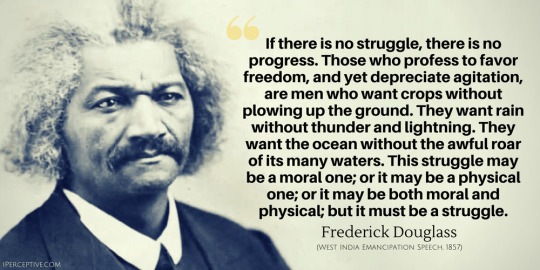
Frantz Fanon:
Privileges multiply and corruption triumphs…Today the vultures are too numerous and too voracious in proportion to the lean spoils of the national wealth. The party, a true instrument of power in the hands of the bourgeoisie, reinforces the machine, and ensures that the people are hemmed in and immobilised.
Thomas Sankara:
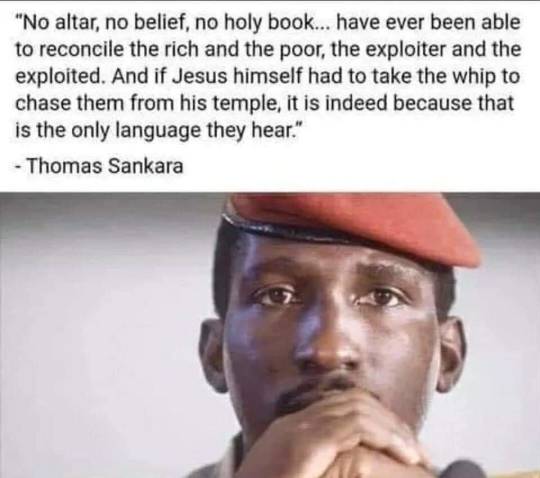
Malcom X:
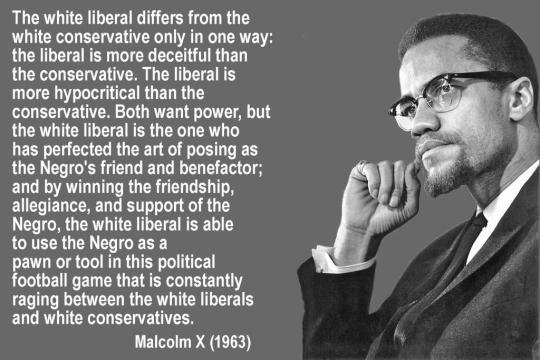
James Baldwin:
In a way, I owe the invitation to the incredible, abysmal, and really cowardly obtuseness of white liberals. Whether in private debate or in public, any attempt I made to explain how the Black Muslim movement came about, and how it has achieved such force, was met with a blankness that revealed the little connection that the liberals' attitudes have with their perceptions or their lives, or even their knowledge—revealed, in fact, that they could deal with the Negro as a symbol or a victim but had no sense of him as a man.
Bonus MLK Jr quote:
Over the last few years many Negroes have felt that their most troublesome adversary was not the obvious bigot of the Ku Klux Klan or the John Birch Society, but the white liberal who is more devoted to “order” than to justice, who prefers tranquillity to equality. In a sense the white liberal has been victimized with some of the same ambivalence that has been a constant part of our national heritage. Even in areas where liberals have great influence— labor unions, schools, churches and politics—the situation of the Negro is not much better than in areas where they are not dominant. This is why many liberals have fallen into the trap of seeing integration in merely aesthetic terms, where a token number of Negroes adds color to a white-dominated power structure."
Whether your medium is a PDF, a book, movie, clips, quotes, podcast, whatever. However you digest info easiest: learn about them and their words. Think about them. Talk about it and process it with friends.
That's how you shape your politics to be similar to the ones you find on my blog.
#malcolm x#mlk jr#thomas sankara#Frederick Douglass#frantz fanon#james baldwin#politics#human rights#justice#protests#theory#colonialism#imperialism#racism#privilege#whiteness#white supremacy#capitalism#usa#liberal#liberalism#white liberals#allies#solidarity#intersectionality
683 notes
·
View notes
Note
niceys positive anon!! i don't agree with you on everything but you are so clearly like well read and well rounded that you've helped me think through a lot of my own inconsistencies and hypocrises in my own political and social thought, even if i do have slightly different conclusions at times then u (mainly because i believe there's more of a place for idealism and 'mind politics' than u do). anyway this is a preamble to ask if you have recommended reading in the past and if not if you had any recommended reading? there's some obvious like Read Marx but beyond that im always a little lost wading through theory and given you seem well read and i always admire your takes, i wondered about your recs
it's been a while since i've done a big reading list post so--bearing in mind that my specific areas of 'expertise' (i say that in huge quotation marks obvsies i'm just a girlblogger) are imperialism and media studies, here are some books and essays/pamphlets i recommend. the bolded ones are ones that i consider foundational to my politics
BASICS OF MARXISM
friedrich engels, principles of commmunism
friedrich engels, socialism: utopian & scientific
karl marx, the german ideology
karl marx, wage labour & capital
mao zedong, on contradiction
nikolai bukharin, anarchy and scientific communism
rosa luxemburg, reform or revolution?
v.i lenin, left-wing communism: an infantile disorder
v.i. lenin, the state & revolution
v.i. lenin, what is to be done?
IMPERIALISM
aijaz ahmed, iraq, afghanistan, and the imperialism of our time
albert memmi, the colonizer and the colonized
che guevara, on socialism and internationalism (ed. aijaz ahmad)
eduardo galeano, the open veins of latin america
edward said, orientalism
fernando cardoso, dependency and development in latin america
frantz fanon, black skin, white masks
frantz fanon, the wretched of the earth
greg grandin, empire's workshop
kwame nkrumah, neocolonialism, the last stage of imperialism
michael parenti, against empire
naomi klein, the shock doctrine
ruy mauro marini, the dialectics of dependency
v.i. lenin, imperialism: the highest stage of capitalism
vijay prashad, red star over the third world
vincent bevins, the jakarta method
walter rodney, how europe underdeveloped africa
william blum, killing hope
zak cope, divided world divided class
zak cope, the wealth of (some) nations
MEDIA & CULTURAL STUDIES
antonio gramsci, the prison notebooks
ed. mick gidley, representing others: white views of indigenous peoples
ed. stuart hall, representation: cultural representations and signifying pratices
gilles deleuze & felix guattari, capitalism & schizophrenia
jacques derrida, margins of philosophy
jacques derrida, speech and phenomena
michael parenti, inventing reality
michel foucault, disicipline and punish
michel foucault, the archeology of knowledge
natasha schull, addiction by design
nick snricek, platform capitalism
noam chomsky and edward herman, manufacturing consent
regis tove stella, imagining the other
richard sennett and jonathan cobb, the hidden injuries of class
safiya umoja noble, algoriths of oppression
stuart hall, cultural studies 1983: a theoretical history
theodor adorno and max horkheimer, the culture industry
walter benjamin, the work of art in the age of mechanical reproduction
OTHER
angela davis, women, race, and class
anna louise strong, cash and violence in laos and vietnam
anna louise strong, the soviets expected it
anna louise strong, when serfs stood up in tibet
carrie hamilton, sexual revolutions in cuba
chris chitty, sexual hegemony
christian fuchs, theorizing and analysing digital labor
eds. jules joanne gleeson and elle o'rourke, transgender marxism
elaine scarry, the body in pain
jules joanne gleeson, this infamous proposal
michael parenti, blackshirts & reds
paulo freire, pedagogy of the oppressed
peter drucker, warped: gay normality and queer anticapitalism
rosemary hennessy, profit and pleasure
sophie lewis, abolish the family
suzy kim, everyday life in the north korean revolution
walter rodney, the russian revolution: a view from the third world
#ask#avowed inframaterialist reading group#i obviously do not 100% agree with all the points made by and conclusions reached by these works#but i think they are valuable and useful to read
925 notes
·
View notes
Text

Proverbios 16:18
Delante de la destrucción va el orgullo, y delante de la caída, la altivez de espíritu.
Pride goes before destruction,
and a haughty spirit before a fall.
— Proverbs 16:18 | La Biblia de las Américas (LBLA) and Revised Standard Version (RSV)
La Biblia de las Américas © 1986, an original work translated from the Hebrew-Aramaic and Greek directly into modern Spanish. The Lockman Foundation and Revised Standard Version of the Bible, copyright © 1946, 1952, and 1971 the Division of Christian Education of the National Council of the Churches of Christ in the United States of America. All rights reserved.
Cross References: 1 Samuel 17:42; Proverbs 8:13; Proverbs 11:2; Proverbs 17:19; Proverbs 18:12; Proverbs 29:23; Jeremiah 49:16
#pride#haughtiness#stubborn spirit#fall#destruction#Proverbs 16:18#Book of Proverbs#Old Testament#LBLA#La Biblia de las Américas#The Lockman Foundation#RSV#Revised Standard Version Bible#National Council of the Churches of Christ in the United States of America
7 notes
·
View notes